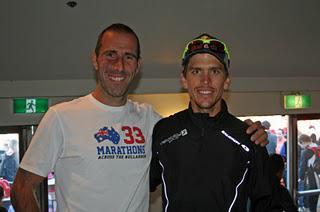 I haven’t blogged for a while, and the reason will be clear to anyone who has been following my preparations for my 33 marathons run. Multiday Ultramarathon training is a big commitment, and this is something I have learnt from picking the brains of people who have been there and done that.
I haven’t blogged for a while, and the reason will be clear to anyone who has been following my preparations for my 33 marathons run. Multiday Ultramarathon training is a big commitment, and this is something I have learnt from picking the brains of people who have been there and done that. When I first decided to go ahead with this I quickly learnt that there is very little information on this sort of training. I put this down to the very low numbers of people who run in such events, and secondly because when running ultras day after day, each individual’s body will perform very differently, so generic training methods would likely not work for anyone. I’ve discovered that there is a lot of trial and error, and the need for flexibility given the time commitment. I loosely designed my training program based upon conversations with some people who have been there before, and I have been lucky to speak with some of the best, Pam Reed, Pat Farmer, Ray Zahab, Deborah De Williams and Ryan Sandes. There are a couple of common themes that I got from their experience and advice.Firstly, you need to have specificity in your training. This should be both mental and physical training. For me this has meant incorporating much more road running, and training when I haven’t wanted to. Basically in the middle of a multiday event you don’t usually get the option to stay in bed if you don’t feel like it, or to have a day off if it’s raining.Secondly, and in line with the first, you want to be training every day. This toughens the mind and body, and helps improve running efficiency. When you body tires, you will subconsciously run with a style that minimises your energy expenditure (albeit slower). The more you do this the more it becomes second nature. For me, this has resulted in developing a normally slower pace, but with a much lower heart rate, hence enabling the body to go longer for the same energy expenditure.Thirdly, training twice a day. This has numerous benefits, beyond the simple practicalities of fitting in high volumes of training around normal life. It teaches the body to recover whilst working, it also has a great mental strengthening benefit. The main benefit that I have noticed is that by running twice a day, you can cover a large daily distance whilst reducing the injury risks associated with running long. So your body gets the training effect, and the joints and tissues strengthened gradually, enabling you to run longer when you have to.
I loosely designed my training program based upon conversations with some people who have been there before, and I have been lucky to speak with some of the best, Pam Reed, Pat Farmer, Ray Zahab, Deborah De Williams and Ryan Sandes. There are a couple of common themes that I got from their experience and advice.Firstly, you need to have specificity in your training. This should be both mental and physical training. For me this has meant incorporating much more road running, and training when I haven’t wanted to. Basically in the middle of a multiday event you don’t usually get the option to stay in bed if you don’t feel like it, or to have a day off if it’s raining.Secondly, and in line with the first, you want to be training every day. This toughens the mind and body, and helps improve running efficiency. When you body tires, you will subconsciously run with a style that minimises your energy expenditure (albeit slower). The more you do this the more it becomes second nature. For me, this has resulted in developing a normally slower pace, but with a much lower heart rate, hence enabling the body to go longer for the same energy expenditure.Thirdly, training twice a day. This has numerous benefits, beyond the simple practicalities of fitting in high volumes of training around normal life. It teaches the body to recover whilst working, it also has a great mental strengthening benefit. The main benefit that I have noticed is that by running twice a day, you can cover a large daily distance whilst reducing the injury risks associated with running long. So your body gets the training effect, and the joints and tissues strengthened gradually, enabling you to run longer when you have to.  Finally, when training for these sort of distances there is no such thing as “junk miles”. It’s all about getting distance in your legs, and getting used to extended periods on your feet.Obviously, with any training you need to take a holistic approach and remember you will be using up far more energy than normal ultra training. So you will need to eat more (a lot more) and make sure you are getting enough sleep.While the physical improvements for me have been a great confidence booster, the psychological gains have been more significant. I have learnt to embrace the pain (corny, but true), keep going through the lows no matter what (they always come to an end) and have taken great confidence from the dedication to commit to the training. It has enabled me to really identify and be aware of my weaknesses, and to pass these on to my crew so they know what to say to keep me going.As with training for any running event, you can use these sessions to experiment with different kit, nutrition, and hydration strategies, and from that work towards developing a race plan. This is very important to have and to stick to, especially from a nutritional standpoint. It’s an area where you are most likely to waver from the plan, and will suffer the most from doing so.Unlike a normal ultra, you need to finish each day with as much in the tank as possible, and even more importantly make sure that you start the next day with a full tank (nutritionally and hydrated). This is a fact to keep in your head at all times, and one that your crew needs to be aware of.So that is what I have learned over the past 4 months, and only time will tell as to how well it all works out.
Finally, when training for these sort of distances there is no such thing as “junk miles”. It’s all about getting distance in your legs, and getting used to extended periods on your feet.Obviously, with any training you need to take a holistic approach and remember you will be using up far more energy than normal ultra training. So you will need to eat more (a lot more) and make sure you are getting enough sleep.While the physical improvements for me have been a great confidence booster, the psychological gains have been more significant. I have learnt to embrace the pain (corny, but true), keep going through the lows no matter what (they always come to an end) and have taken great confidence from the dedication to commit to the training. It has enabled me to really identify and be aware of my weaknesses, and to pass these on to my crew so they know what to say to keep me going.As with training for any running event, you can use these sessions to experiment with different kit, nutrition, and hydration strategies, and from that work towards developing a race plan. This is very important to have and to stick to, especially from a nutritional standpoint. It’s an area where you are most likely to waver from the plan, and will suffer the most from doing so.Unlike a normal ultra, you need to finish each day with as much in the tank as possible, and even more importantly make sure that you start the next day with a full tank (nutritionally and hydrated). This is a fact to keep in your head at all times, and one that your crew needs to be aware of.So that is what I have learned over the past 4 months, and only time will tell as to how well it all works out.  There will be plenty of regular updates from the Nullarbor Plain, on here, the event website (www.33marathons.com), the Facebook page (www.facebook.com/33marathons) and through our Twitter feed (www.twitter.com/33marathons) .Please cheer us along, and if you are able, make a donation to our fantastic charities.Run HappyAndy“We are what we repeatedly do. Excellence, then, is not an act, but a habit.” - Aristotle“Obsessed is a word that the lazy use to describe the dedicated”
There will be plenty of regular updates from the Nullarbor Plain, on here, the event website (www.33marathons.com), the Facebook page (www.facebook.com/33marathons) and through our Twitter feed (www.twitter.com/33marathons) .Please cheer us along, and if you are able, make a donation to our fantastic charities.Run HappyAndy“We are what we repeatedly do. Excellence, then, is not an act, but a habit.” - Aristotle“Obsessed is a word that the lazy use to describe the dedicated”
www.ultrarunning.com.au

